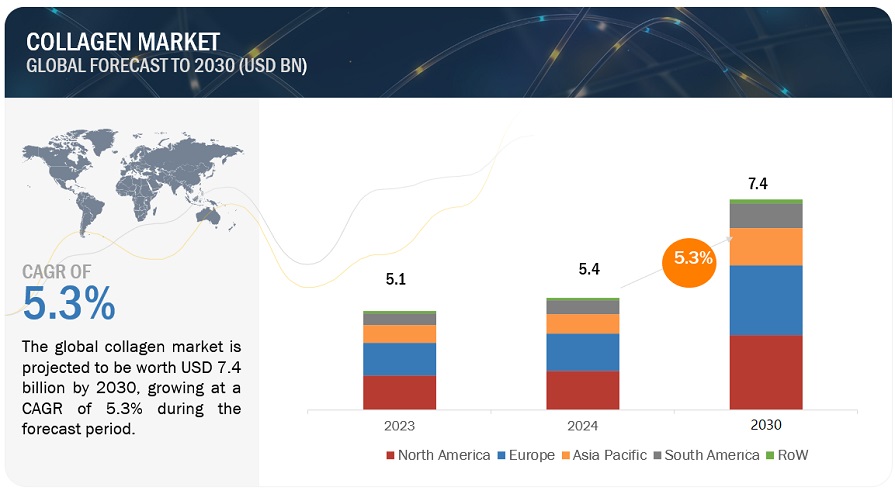The global collagen market, valued at USD 5.1 billion in 2023, is poised for significant growth, projected to reach USD 7.4 billion by 2030, reflecting a compound annual growth rate (CAGR) of 5.3%. This expansion is driven by multiple factors, including rising health and wellness trends, an aging population seeking age-related remedies, and the beauty industry’s demand for collagen-based anti-aging products. Additionally, collagen’s integration into functional foods and beverages to meet nutritional needs, its role in supporting joint health in sports nutrition, and its use in wound healing and tissue engineering within healthcare further elevate its prominence. As consumer interest in sustainable options grows, there is increasing demand for plant-based collagen sources, supported by ongoing research that continuously uncovers new applications across various industries.

Download PDF Brochure:
https://www.marketsandmarkets.com/pdfdownloadNew.asp?id=220005202
The marine collagen segment, in particular, is expected to experience the highest growth rate during the forecast period. Marine collagen has become a market leader due to its sustainability, as it is derived from fish by-products, reducing waste and appealing to eco-conscious consumers. Known for its high bioavailability, marine collagen is efficiently absorbed by the body, making it a popular choice for supplementation. Its versatility spans dietary supplements, cosmetics, and medical products, with a particular focus on Type I collagen, which supports skin, hair, and joint health. Additionally, its allergen-free nature and compatibility with diverse dietary preferences contribute to its broad appeal. Continued research and innovation in marine collagen further solidify its position in this expanding market.
In 2022, the nutritional products segment became a significant driver of the collagen market. Increasing consumer awareness of collagen’s role in promoting skin elasticity, joint health, and overall vitality has boosted its demand. This trend is particularly prominent among aging individuals seeking to mitigate the natural decline in collagen production. Additionally, the rise of the fitness and wellness industry has highlighted collagen’s benefits for joint flexibility and post-exercise recovery, further fueling its popularity. Collagen’s adaptability in various forms, such as powders, capsules, and functional foods, has cemented its place as a staple in daily nutrition routines. The beauty industry’s recognition of collagen’s external benefits, combined with advancements in food science, has led to the development of convenient and appealing collagen-infused products, meeting the growing consumer demand for holistic wellness solutions.
Make an Inquiry: https://www.marketsandmarkets.com/Enquiry_Before_BuyingNew.asp?id=220005202
The United States is expected to maintain its leading position in the North American collagen market throughout the forecast period. The growth of the pharmaceutical sector, driven by the increasing prevalence of chronic diseases and advancements in drug delivery technologies, has expanded the use of collagen in medical applications, including wound care, pain management, and tissue repair. Collagen’s effectiveness in treating conditions like arthritis and supporting bone health will likely boost its demand in the region. Furthermore, collagen peptides are increasingly used in dentistry for their hemostatic properties, aiding in rapid blood coagulation.
The U.S. convenience food industry is also experiencing significant growth, with consumers seeking diverse, nutritionally balanced products. Collagen’s high protein content, fat-free nature, and role in weight management make it an appealing ingredient for manufacturers targeting health-conscious consumers. With more than a third of U.S. adults affected by obesity, there is considerable potential for collagen-based products that cater to the demand for lower-calorie, nutritionally fortified food and beverages.
Leading Collagen Manufacturers
Key players in the collagen market include Darling Ingredients (US), Ashland (US), Tessenderlo Group (Belgium), Gelita AG (Germany), Nitta Gelatin Inc. (Japan), and Titan Biotech (India).
Darling Ingredients
Darling Ingredients specializes in the development and production of sustainable natural ingredients derived from both edible and inedible animal by-products. The company serves diverse industries, including food, animal feed, fuel, bioenergy, and fertilizer, offering tailored solutions to meet specific needs. Its segments include feed ingredients, food ingredients, and fuel ingredients.
Within the Feed Ingredients category, Darling Ingredients collects and processes by products from cattle, poultry, and pork. Additionally, the company gathers bakery leftovers, converting them into cookie meals in North America. Wasted cooking oil is also collected and processed into non-food grade fats. The Food Ingredients segment involves the collection and processing of porcine and bovine intestines, as well as the acquisition and processing of beef and pork bone chips, cattle hides, pig skins, and fish skins into collagen. Collagen peptides, sold under this segment through brands like Rousselot and Peptan, are utilized in various gelatin and collagen-based products for global industries and consumers.
Darling Ingredients has gained prominence in Western markets, contributing to the growth of the Nutri cosmetics industry outside Asia with its collagen peptide products. Operating in 270 plants across five continents, the company extracts value-added products, including green energy, renewable diesel, collagen, fertilizer, animal proteins and meals, and ingredients for pet food, from approximately 10% of the world’s meat industry waste streams.
Ashland
Ashland is a global corporation specializing in the production of unique ingredients and additives, with a commitment to enhancing the world. The company actively engages with clients across diverse industries, including pharmaceuticals, personal care, architectural coatings, construction, energy, food, beverage, and nutraceuticals. Ashland emphasizes sustainability in its operations and conducts research to improve its products. The business is structured into units such as life sciences, personal care and household, intermediates and solvents, and intersegment sales. Within the personal care and household segment, Ashland Global Holdings offers collagen.
One notable product introduced by Ashland in France in 2013 is the Actopenting biofunctional, an innovative bio-engineered peptide designed based on skin structure. This product supports the skin’s natural production of dermatopontin, a vital protein crucial for restoring skin structure. Notably, Ashland’s peptide was the first commercially available product proven to enhance the presence of various proteins supporting skin structure, both in vitro and ex vivo. Operating in over 100 countries, including North America, Europe, the Asia Pacific, and Latin America, Ashland is dedicated to advancing its industry with a global reach.